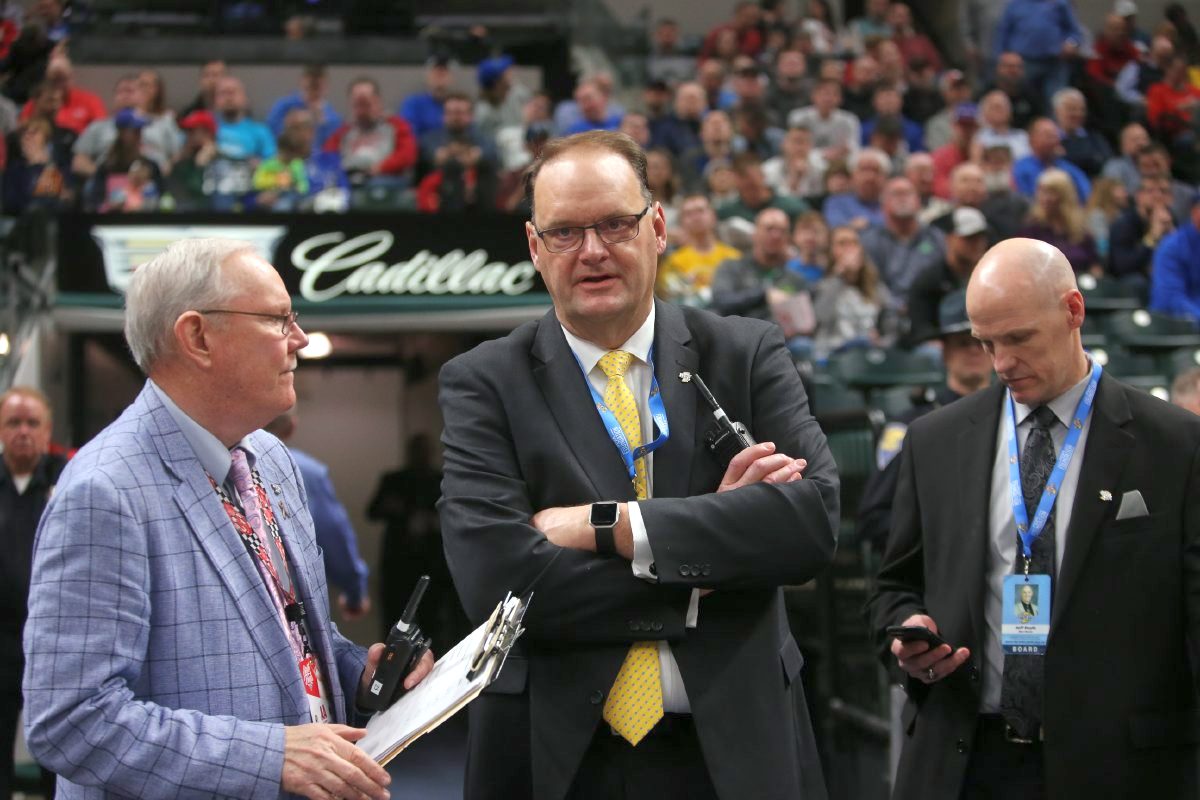
At the end of July, Paul Neidig will officially take over as the commissioner of the Indiana High School Athletic Association.
His move into the top job comes at one of the more uncertain times in the organization’s history.
Neidig, currently in his third year as an IHSAA assistant commissioner after working for 31 years as a teacher, coach and administrator in Evansville, is set to succeed Bobby Cox when he retires. What the high school sports landscape will look like by then is anybody’s guess, but Neidig isn’t shying away from the unknowns.
Neidig recently jumped on the phone for a brief question-and-answer session about the current state of affairs and what might be awaiting him as he starts his new job.
[sc:text-divider text-divider-title=”Story continues below gallery” ]
(Editor’s note: This interview was conducted prior to Thursday’s announcement that Indiana schools will be closed for the remainder of the school year. The IHSAA announced later Thursday afternoon that it was cancelling its spring tournament series. The below Q and A has been abridged accordingly.)
Q: With Indiana and all of America in the middle of the COVID-19 outbreak, you’re entering the commissioner’s office at a most unusual and uncertain time. How much does this change your transition and your approach to the job?
A: I don’t know that it changes a whole lot. Luckily, I’ve been around the association for a while. Obviously, commissioner Cox and I have some things we’ve got to work on through the transition here, but our transition’s going to be fine. My bigger concern is the student-athletes that aren’t getting to do what they love to do right now.
Q: Were there concerns that by holding off so long on making a decision about the spring season, you may have been providing some with a false sense of hope? Or was it simply about leaving that window open for as long as possible?
A: I really think that providing hope is much better than providing no hope. … If we would go ahead and just say, "We’re done. We’re not even going to try," I think that rips the rug out from underneath people. I think people truly appreciate(d) the fact that (we were) willing to still attempt to get a state tournament series in here.
Q: With none of us knowing how this pandemic will play out over the next few days, never mind months, do you have concerns that this could spill over and impact the fall season, disrupting the official beginning of your tenure?
A: I wouldn’t call it a concern. I think it’s something that we certainly need to keep an eye on. There are some experts predicting that this may come back in the fall, but treatments are going to be better. It’ll be a completely different ballgame, I think, if we get to the fall.
Q: The spring season doesn’t have any sports that are big revenue producers for Indiana high schools. Football, obviously, is a different story. Is that something you’ve talked about with others or is it too far over the horizon to worry about yet?
A: I think it’s too far off right now to even think about. If we get to that point to where a high school football game or soccer match can’t be played in the fall, we’ve got some significant problems as a country in areas other than just sporting events.
Q: No matter how the next few months play out, this likely won’t be the smooth introduction to the job you might have hoped for. Are you ready to face — or even embrace — the potential challenges you might be facing come August?
A: I think that’s the only way you can go. As athletes … we’ve all been trained to deal with adversity. We can’t sit back and say, "Oh, poor us," and look for the sympathy. We’re ready to go. We can’t control this hand, but we can manage this hand and manage what we’ve been dealt. I think that’s what our schools do, our athletic directors, our coaches, our student-athletes — that’s where they need to keep their focus, just what they’ve been trained to do as an athlete. And that’s what we’re prepared to do.
Q: If, hypothetically, things have settled down by summer’s end and you can enter the 2020-21 school year in a normal way, do you envision making any other big changes to how the IHSAA runs things?
A: I think jumping in and making wholesale changes, for any new leader of an organization, is a mistake. Certainly, there are areas where we need to improve in. You’ll never hear me say there aren’t, but I want to look at it from the commissioner’s seat. We’re going to make changes as they’re appropriate if they’re good for the sport. We’re going to listen to people, and we’ll make decisions and changes based on that. It’s not going to be just a magic wand and we’re going to change all kinds of different things. In any job I’ve ever gotten or done, as an athletic director or whatever, I’ve never approached my work that way. I’m always in a state of evaluation, and then make adjustments based upon the evaluation and the data and what’s going on out there.
